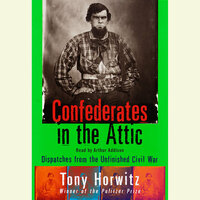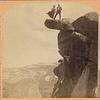Take a photo of a barcode or cover
This was a fascinating read, although there is some crudity and language. I found it terribly sad how one woman lived and died to find out more about her Confederate ancestors, not even caring if she went to heaven or hell, because "either way, it'll be heaven just to get that information."
The author finds a range of unique characters, bizarre stories, museums, and history, so you never know what's around the bend. The writing style is fresh and easy to follow, making it fun and easy to remember.
Also, the author seems to want to find out the truth objectively, hunting down leads and trying to see both sides of the story. If I've learned anything it's that both sides of the War Between the States each have perpetuated myths, and almost everyone wants to be in the right. But was either side totally right? Was there even a need for the War to begin with? This certainly made me think and was interesting, though it's not a book for children, and should be read with care. It basically is a starting point, which prompts me to want to learn more.
The author finds a range of unique characters, bizarre stories, museums, and history, so you never know what's around the bend. The writing style is fresh and easy to follow, making it fun and easy to remember.
Also, the author seems to want to find out the truth objectively, hunting down leads and trying to see both sides of the story. If I've learned anything it's that both sides of the War Between the States each have perpetuated myths, and almost everyone wants to be in the right. But was either side totally right? Was there even a need for the War to begin with? This certainly made me think and was interesting, though it's not a book for children, and should be read with care. It basically is a starting point, which prompts me to want to learn more.
My favorite book about the American Civil War. Such a great, sweeping adventure in America's imagination of the past.
This book is basically a "slice of life" book about Southerners who can't let go of the Civil War. The author expertly mixed dry wit ("...a modest wig store called OK Wig") and detailed descriptions of the people and places all throughout the South. However, by the end, I just was numb to the ingorance and prejudice of the people he was writing about. There were too many instances of my shock and horror about what these people believed in for me to fully love this book. I guess he wanted to fully immerse himself in their life, but some parts (and they all seemed to be in a row) were too much. However, there are definitely awesome stories, especially the one about the Japanese tourists who love the Scarlett O'Hara impersonator. Since this was written in the 90s, I'm so curious to know what is happening now and what the internet presence for these groups and people are.
Funny, disturbing, point-your-finger-in-laughter goodness!
A really odd book. The author is both Jewish and obsessed with the Civil War. He treks through the South looking for Southern attitudes about race and the ar, but also people who are similarly obsessed with the war who are not racist. So it becomes a sort of Southern attitudes travelogue in spots. But he is also visiting battlefields and reconstructing some of the history of the war itself. He asks many interesting questions such as should the nation attempt to put aside all remembrances of the war and focus more on unity (whatever that would look like) or should the war and the statues and the battlefields be preserved as an important recognized part of American history (the war is barely taught in the South at all). He also moves into the present pointing out that black and white culture today is nearly as segregated as it was during the Plessy v. Ferguson days and that housing and opportunity for blacks (particularly in the South, but in the North in places as well) are poor. His favorite city was Atlanta which in his opinion did the best job of integrating memorials to the Confederacy with more contemporaneous memorials to prominent black and white artists and other celebrities.
A really thoughtful book.
A really thoughtful book.
I enjoyed this book, particularly the stories and interviews with people Horwitz met while traveling throughout the south. I found the Wargasm section and the descriptions of battles and battlefields to be a bit tedious. Recommended for those who have an interest in Civil War history.
Endless stories of people (mostly in the South) keeping the Confederate spirit alive by saving and selling memorabilia or re-enacting battles as authentically as they can. I’m not sure what the point of the book was since I only got through two chapters. Probably each chapter would have made an interesting magazine piece, but a whole book was too much for me.
challenging
informative
reflective
medium-paced
File this one under "interesting and well-written, but ultimately frustrating."
I can sum up why the book is frustrating with a single passage. After spending 300 pages describing his travails among various Civil War reenactors, Lost Cause boosters, and open racists, Tony Horwitz goes to an event commemorating the civil rights movement in Selma, Alabama. Listening to people talking about the past struggle, the current setbacks, and the ultimate righteousness of the cause, Horwitz concludes that these people are much the same as the ones lamenting the fact that they had to give up owning people are a cornerstone of their economic and social existence. But these things are not the same, and will never be the same, and only someone utterly ignorant or completely blinded by his own delusions of past Confederate grandeur could treat them as though they are the same.
Is it possible to feel pride in the South's past without being a racist? I don't know, but by the end of the book Horwitz has to acknowledge that an awful lot of the folks he's been hanging around with tend to be at least racist-adjacent, a fact that's been obvious to the reader since about chapter 2. While I don't think any reasonable person would blame a modern Southern for things that happened 160 years ago, it's hard not to resent the way they continue to moan about how awful Yankees are, and how they've been so persecuted because of the unfair way slavery was depicted. Spare me.
In short, probably most appealing to someone with an interest in the Civil War and with an ability to refrain from grinding your teeth while some dinky white computer geek from Atlanta waxes about the pride of Southern heritage.
I can sum up why the book is frustrating with a single passage. After spending 300 pages describing his travails among various Civil War reenactors, Lost Cause boosters, and open racists, Tony Horwitz goes to an event commemorating the civil rights movement in Selma, Alabama. Listening to people talking about the past struggle, the current setbacks, and the ultimate righteousness of the cause, Horwitz concludes that these people are much the same as the ones lamenting the fact that they had to give up owning people are a cornerstone of their economic and social existence. But these things are not the same, and will never be the same, and only someone utterly ignorant or completely blinded by his own delusions of past Confederate grandeur could treat them as though they are the same.
Is it possible to feel pride in the South's past without being a racist? I don't know, but by the end of the book Horwitz has to acknowledge that an awful lot of the folks he's been hanging around with tend to be at least racist-adjacent, a fact that's been obvious to the reader since about chapter 2. While I don't think any reasonable person would blame a modern Southern for things that happened 160 years ago, it's hard not to resent the way they continue to moan about how awful Yankees are, and how they've been so persecuted because of the unfair way slavery was depicted. Spare me.
In short, probably most appealing to someone with an interest in the Civil War and with an ability to refrain from grinding your teeth while some dinky white computer geek from Atlanta waxes about the pride of Southern heritage.
Although this book is two decades old, it taps into the roots of many issues we still face today. As someone who grew up in the North with very little exposure to the South’s perspective, this book was extremely enlightening to me - particularly chapter 5, which was really difficult to read due to the harrowing content (it took me about a week to read it since it contained views with which I deeply disagree). All in all, I think this is an important read for anyone interested in the Civil War, different perspectives of history, and/or racism in the United States





